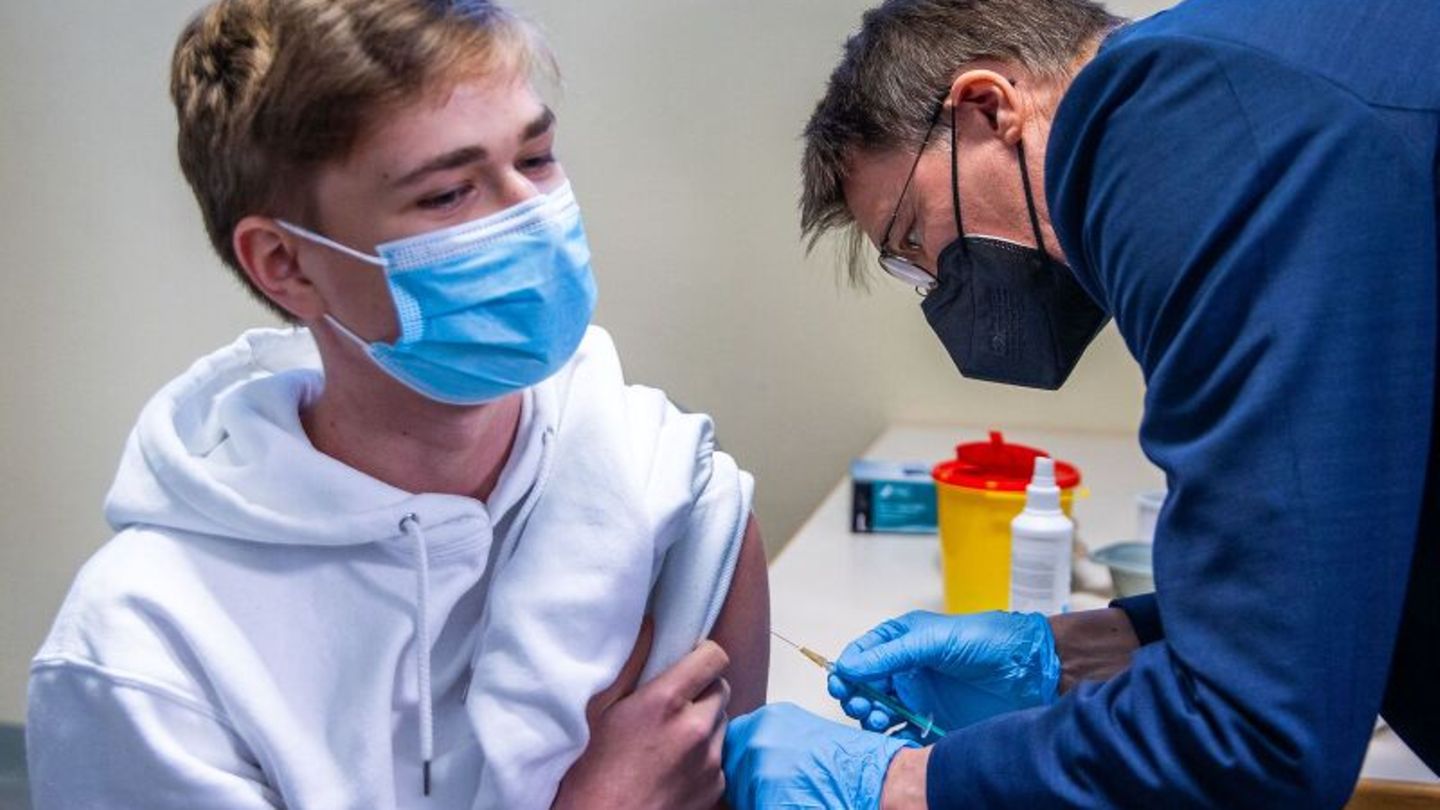While Germany is still discussing compulsory vaccination, other countries are already one step further. The obligation already applies in Indonesia and Turkmenistan, and it should come in February in the first EU country. An overview.
Hardly any word fuels the corona debate in Germany as much as compulsory vaccination. Every week, thousands of people take to the streets in several German cities against the impending duty. In current surveys, on the other hand, a clear majority is in favor of general corona vaccination.
There is no consensus in the federal government either. Chancellor Olaf Scholz (SPD) has envisaged compulsory vaccination “until the beginning of February or the beginning of March”. At the same time, the coalition partner FDP is moving away from the idea. Many liberals question the proportionality of the highly contagious omicron variant, which is believed to be less dangerous. For Health Minister Karl Lauterbach, however, it is clear that Germany can only achieve an appropriate vaccination rate with compulsory vaccination – this is currently around 73 percent.
A look abroad shows that other countries are also following the mandatory path, such as Indonesia and Turkmenistan. Austria is the first EU country to plan the introduction for February. Other countries such as France, Italy or Greece, on the other hand, rely on partial vaccination. An overview.
The general obligation to vaccinate already applies here
Indonesia is so far the most populous country in which a general corona vaccination applies. The presidential republic with around 273 million inhabitants introduced compulsory vaccination for all citizens over the age of 18 in February 2021. But due to logistical problems and a shortage of vaccines, the vaccination rate in the island state is just almost 43 percent. Nevertheless, those who do not get vaccinated face fines and reduced social benefits.
In the closed dictatorship Turkmenistan,where to official figures so far there has not been a single corona case, the situation is not much better. In July last year, the autocratic government introduced compulsory vaccination for everyone over the age of 18. According to WHO information, only 53 percent of the population had been vaccinated by December. Those who are not vaccinated face dismissal and fines.
Since February of last year, the Vatican compulsory vaccination for the approximately 800 residents and all employees. The Papal States is a special case: what the Pope says is de facto law. Pope Francis, a convinced “Pro Vax”, spoke in a video message of vaccination as an “act of love” – love for oneself and above all love for one’s neighbor. For the employees, the papal appeal is therefore tantamount to compulsory vaccination.
A general corona vaccination from the age of 18 also applies in the Central Asian country Tajikistan as well as in the island state Micronesia in the western part of the Pacific Ocean. Also in Ecuador compulsory vaccination for everyone over the age of five. However, it is unclear when this will be introduced.
Austria wants to be the first EU country to become a pioneer
As the first country in the EU plans Austria on February 1st, the introduction of a general vaccination requirement from the age of 18. Anyone who has not been vaccinated by then will be reminded of their obligation by letter in mid-February. A month later, a fine of 600 euros will be due, after which there could even be a threat of up to 3600 euros, according to the plan. The law applies to all people residing in Austria. Exceptions are only made for pregnant women and people who cannot be vaccinated for medical reasons. Those who have recovered should be released from duty for 180 days.
This Thursday, the National Council is to vote on the draft law, a majority is considered safe: Of the opposition parties, only the FPÖ rejects the project. However, the start of compulsory vaccination could be delayed, since the administration of the vaccination register with millions of data is complicated and the effort for the authorities is considered immense.
Other countries rely on partial vaccination
Several other countries have already decided to make partial vaccination compulsory instead. In contrast to the general obligation to vaccinate, this only covers certain age or professional groups.
For example, in France Since mid-September, all employees of hospitals, old people’s or nursing homes, nursing services, rescue services, police, public transport and fire brigades have had to be vaccinated against the corona virus. Those who do not comply with the rule are released without salary. From mid-January, even a negative test should no longer be enough to participate in social life. The French government only wants to grant access to restaurants, bars, cinemas and the like to those who have been vaccinated. Children under the age of twelve are excluded, the recovered status has not yet been finally clarified.
In Italy since January 8th, all over 50-year-olds are obliged to be vaccinated. Anyone who has not been vaccinated at least once by the beginning of February faces a fine of 100 euros. The appeal seems to be working: Since then, the number of first vaccinations in this age group has increased significantly. In addition, there is a vaccination requirement in the healthcare system, in education, in the police force and in the military. The “Green Pass” has also been in effect for all other employees since October of last year: Anyone who wants to work must present proof of vaccination, recovery or negative tests.
Since this Monday is in Greece compulsory vaccination for people over the age of 60. Vaccination has also been compulsory for staff in retirement homes since mid-August and for healthcare workers since September. Those who do not follow the rules are released without salary.
Germany is going its own way
A look across the borders shows that all countries that have introduced or announced compulsory vaccination to date have taken direct decisions. Whether in Indonesia or Austria, the laws came directly from the government.
In contrast, the German federal government relies on a majority in parliament. According to the will of Chancellor Scholz and the traffic light coalition, the law should be drawn up from the middle of parliament and then put to the vote without party pressure. The Social Democrats are planning a first concrete proposal for this at the end of January, while the Greens do not want to submit their own application. So far, there has only been one application from the Bundestag Vice President Wolfgang Kubicki from the FDP, in which compulsory vaccination is rejected.
So far, the only thing that is certain is that from March 15th, vaccination will be compulsory for staff in the medical and nursing sector. The debate about general corona vaccination, however, continues.
Sources: “”, “”, with DPA material
Source From: Stern
David William is a talented author who has made a name for himself in the world of writing. He is a professional author who writes on a wide range of topics, from general interest to opinion news. David is currently working as a writer at 24 hours worlds where he brings his unique perspective and in-depth research to his articles, making them both informative and engaging.



